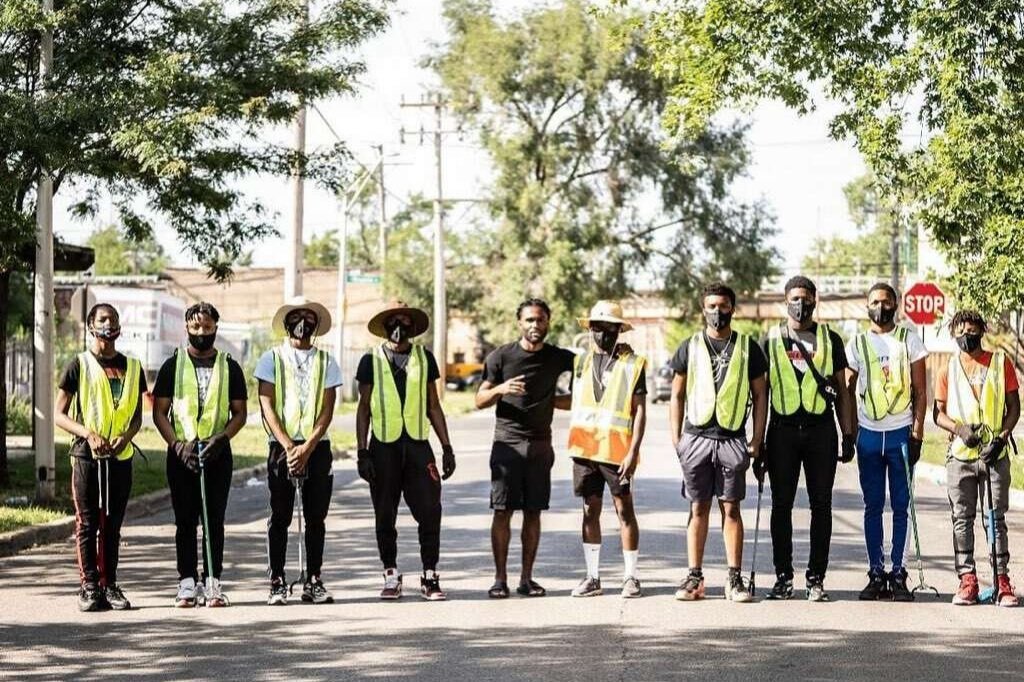Leading with Trust Means Being Accountable to Community
At Chicago Beyond, trust-based practice means trust in proximate leadership and communities that have been underserved and underfunded by philanthropy.
By Chicago Beyond
This photo comes from Hood Heroes. Hood Heroes reinforces social and emotional health, work ethic and community ownership with teens on the west and south side of Chicago. It is the vision of Jarvis Buchanan, based on his personal experience as a Black teen on the west side of Chicago.
Chicago Beyond is a family funder and learning organization. We depend on our trust-based network for so many things, from rapid response funding and multi-year partnerships to systemic work.
Which is why, who gets trusted is on our minds.
Take, for example, “open calls.” As the name implies, we do not intend to exclude. But like many other funders, we have noticed that the “open” door approach often means the same nonprofits show up. In a large city like Chicago, there are perhaps 150 nonprofits that consistently appear on funding lists. And yet, the IRS database shows the number of registered nonprofits to be closer to 30,000. Of course there are reasons that some 501c3 are not receiving funding, including being non-operating nonprofits or related entities. But even so, when it comes to who gets trusted with money, the list is short. In looking at who receives funding, the data show that proximate leaders are the exception, and not being from the community is the norm. It is well documented that Black leaders receive disproportionately fewer grants, in smaller amounts, with more restrictions, for a shorter time.
So when Chicago Beyond extended our rapid response from 2020 to meet the multiple and long-term crises facing Black and brown communities, we wanted to challenge ourselves not just to move relationally in the communities we serve, but to take the power of network to the next level. In preparing to make 100 mostly out-of-the-blue responsive grants based on trust, we wanted to be intentional about, and take a decidedly different approach to, whose trust we were working to earn, and who was getting opportunities to be trusted.
To take this on meaningfully, Chicago Beyond was advised by a People’s Assembly – a group made up of committed Chicagoans who offered ideas, advice, and suggestions on individuals doing invaluable block-by-block work in their communities that often go unnoticed and unfunded. People participated not based on institutional title or power, but rather the power of their community relationships. The process brought us into relationship with new community members: a passionate social worker; a hot sauce business founder and advocate for others who grew up in the foster system; primary school principals; a journalist; a young Black father; a specialist at the power utility; organizers; a grandmother. The networks took us to networks which took us to networks. We applied multiple strategies from holding office hours to sourcing sprints in geographic and topic areas where we knew our starting network had gaps. Coming across people and organizations not already familiar to us, with minimal demands on their time, was a metric we set ourselves.
Putting ourselves on the dashboard in this way, we could review our own impact. The 100 mostly out-of-the-blue grants reached Black and brown leaders and proximate leaders with personal experience informing their approach. Many were fiscally sponsored, some were individuals. Many had never worked with a funder. The vast majority were new to Chicago Beyond. Consistent with the responsive intent of this fund, their work is hyperaccountable: these organizations and individuals face the people they serve not just 9am-5pm behind the barrier of a desk, but by being in relationship, on the weekend, at church, on their blocks. They, and we, could see their accountability to people benefiting from their work. They showed their mutual care and trust in the scores of $5 donations online from young people or $5 bills put in their coffee cups by elders because the work helped them feel safe. And, the same trust and accountability these organizations and individuals hold in their communities, we tried to earn from them—hearing feedback, acting on feedback.
We also heard too many times to count: “Thank you for seeing me.” “Thank you for seeing us.” We saw eagerness to pay it forward, with organizations nominating their collaborators and networks to receive rapid response funding. We saw a kaleidoscope of precise and context-specific approaches: responding to grief, supporting joy, keeping one another safe, feeding, assisting with rent, supporting self-determination, educating, cultivating community spaces. Ten young people learned they could organize 100 people to feed 5,000. Survivors of sex-trafficking found safe shelter through the leadership of people who shared their experience.
There is abundance of work worthy of trust. We are excited to keep reaching beyond the familiar partnerships and processes, and to root our work in being accountable to the freedom of communities we exist to serve. Throughout, we hope to keep asking ourselves the question: How can we do better on who gets trusted?

